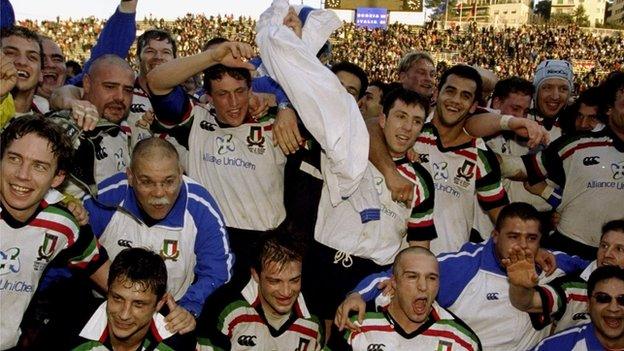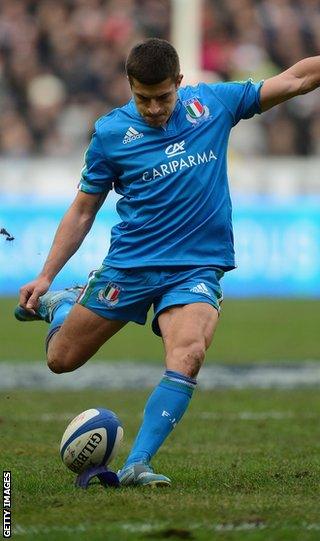Six Nations 2014: Rome past continues to haunt Scotland
- Published

Italy defeated Scotland 34-20 in their first ever Six Nations match
Scotland travelled to Rome in February 2000 to face Italy in the inaugural Six Nations having won the last edition of the tournament in its previous guise.
Arriving at the Stadio Flaminio with a spring in their step as Five Nations champions, the Scots left on the wrong end of a 34-20 beating.
You could argue they've not looked like contenders since.
Former Italy captain Massimo Giovanelli made his final international appearance in that victory 14 years ago, and he says his side were determined to mark Italy's first match of the tournament with a victory.
"It was a funny day, a fantastic day for the Italian side," Giovanelli recalls. "We were through the door of a new era for Italian rugby, but also a new history, a new future for us.
"Before it was rugby played between friends, not professional. The future for our sport was not so clear.
"Sometimes it happens that when you have a meeting with history, there is no way to lose a game. We were coming from a very bad World Cup in 1999, in the middle of a change from the old generation of players, those who done the long way to arrive at the Six Nations, players who beat France in Grenoble in 1997.
"The new generation was coming out, Mauro Bergamasco and other players.
"It was the second game of the Brad Johnson era, so it was not easy for us to play against the best team from the season before.
"To play against them, the winners of the last ever Five Nations, it was a very big deal for us."
The Scotland team of 2014 is reeling from chastening defeats to Ireland and England, with fans worrying for the future of the game, but Giovanelli does not go along with the opinion aired in some quarters that this is the worst Scottish side ever.

Tommaso Allan has a 50% goal-kicking rate in the Six Nations
"One of the worst Scottish sides I've ever seen was when we lost against Scotland in the World Cup in France in 2007," he says. "It was a very poor game, and I think that team was not so fantastic.
But Giovanelli, who won 60 caps for the Azzurri between 1989 and 2000, is surprised by Scotland's set-piece struggles.
"To see the Scottish game without line-out ball is like to eat a pizza without tomatoes," he laughs. "So what is important now is to find the way again to have ball from scrums and line-outs."
One quality the Scots will need in abundance when they go to battle in Rome is mental toughness, but Giovanelli also detects a weakness in this area.
"The Scottish side is not a very tough team," he adds. "I think it's one of the problems. I think of the Gavin Hastings period, of the David Sole period - players that were natural leaders inside the team. Maybe it's too easy for the players to arrive at the highest level.
"The players have to remember that to wear the jersey of the country is a big honour. What I remember about the Scottish side is they were proud to wear the jersey.
"When I saw the second half against Ireland, it was like the team had accepted they were going to lose."
A problem for Scotland in recent years has been finding an undisputed starter at fly-half. Galling then that the man who will don the number 10 jersey for Italy is a player that slipped through Scottish clutches - Tommaso Allan.
'Tommy' Allan - as he's known in Scottish rugby circles - progressed through the ranks of the Scotland youth set-up all the way to Under 20 level, before deciding to pledge his international future to Italy.
Giovanelli rates Allan highly, but warns against putting too much pressure on his 20-year-old shoulders.
"Since Diego Dominguez was 35 years-old we've had a problem at fly-half with Italy," says the former skipper.
"Every time a decent player comes out we think we have found a solution to our problem. The player has to play first of all in his club. If he doesn't play regularly in his club then I don't think he is the solution. But he has big potential."
Since the inception of the Six Nations, the tournament has often appeared to be split into two competitions - a fight between Scotland and Italy for the Wooden Spoon as the other four slug it out for titles and Grand Slams.
Giovanelli hopes that his nation can rise above the monotony of the battle at the bottom and start to challenge at the top.
"Italy needs to improve the game of the clubs, the system and the national side," he continues.
"Maybe we will be lucky in five, six years we can have a new generation of players, but we have to arrive by steps. The first step is to place ourselves in the middle (of the Six Nations table) and stay there for three or four years. Then you can jump. With a good calendar you can find a way to win."
Sensible targets for steady progression you might say.
Scotland have set very public - and much derided - targets of winning Six Nations titles, Grand Slams and World Cups, but the immediate target has to be coming away from Rome with a win.
- Published21 February 2014
- Published19 February 2014
- Published19 February 2014
- Published19 February 2014
- Published18 February 2014
- Published18 February 2014